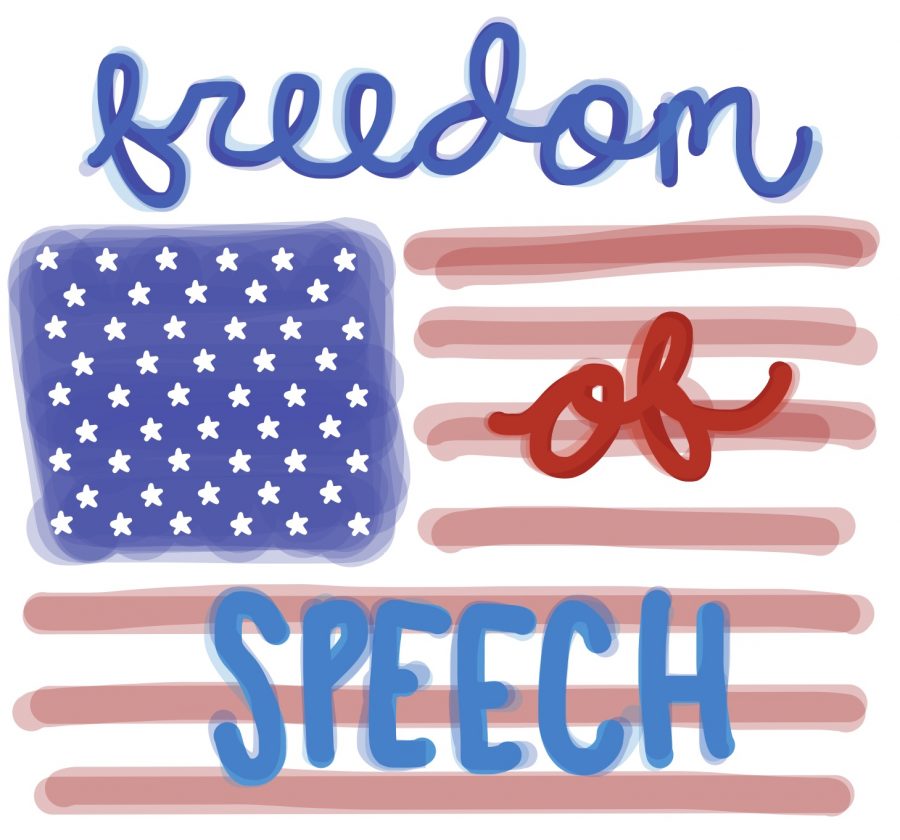The debate on the enumerated right to freedom of speech in the First Amendment.
Supporting/Opposing: Freedom of Speech
“Congress shall make no law respecting an establishment of religion, or prohibiting the free exercise thereof; or abridging the freedom of speech, or of the press; or the right of the people peaceably to assemble, and to petition the Government for a redress of grievances.” — Amendment 1, Constitution of the United States of America. The First Amendment, part of the Bill of Rights, was adopted by the states on Dec. 15, 1791. Although most agree this amendment protects several fundamental rights of the American people, specifically the freedom of speech, even this amendment has become the center of some controversy. Below are two differing arguments relating to Americans’ right to free speech.
November 28, 2019
Supporting
Many Americans who support the First Amendment, especially the freedom of speech, argue that this is a key aspect of the Bill of Rights because it provides protection for one of the most essential pillars that our nation was founded on — the freedom to speak openly, to express opinions without restraint or censorship, to protest publicly, and to share ideas without the government interfering or punishing citizens for contrary beliefs.
Strong advocates of the First Amendment and the freedom of speech claim that this right protects “each of us from the influence of special interests,” according to Natalie Regoli, editor in chief of ConnectUs. Freedom of speech may prevent tyranny of the majority, allows minorities the opportunity to share their beliefs openly and usually without consequence, and ensures those in power cannot become overpowering dictators. Individuals have the freedom to “express criticism of those who are in power” (ConnectUs).
While controversy in America today may be one of our nation’s greatest weaknesses, it can also be viewed as one of our largest strengths. We are a country full of diversity, varying opinions, and differing beliefs — we challenge each other’s perspectives, cause each other to re-examine our own worldviews, and we prevent our country from becoming controlled by one perspective. Freedom of speech exposes people to ideas that are contrary to their own, creating “resiliency,” as Regoli claims, and promoting the pursuit of truth, instead of citizens content to remain blinded by their own beliefs.
In addition, freedom of speech encourages “the free exchange of ideas.” Regoli explains how this works: “When a society operates in an area where free speech is given to all, then there is a more significant exchange of ideas that occur. It becomes almost impossible for those who are in power to suppress truths that they may not want to let out in the open. This process allows for progress to occur because people can learn from the experiences and perspectives of one another without worrying about the dogma of a ‘Big Brother’ element in society, either corporate or government-based.”
As Lea Despotis explores in her article “Your Permanent Record: Can You Erase It?”, freedom of speech can also promote exposure of unethical or illegal activities, shown through the example of Edward Snowden, who leaked secrets and information regarding the surveillance and privacy of American citizens to the press. This has become an area of controversy about whether Snowden’s actions were justified or not, but many strict adherents to the freedom of speech believe it was his right to uncover the unlawful actions the government was performing and to inform Americans about a situation that directly affected them.
Regoli also shares how freedom of speech can increase knowledge of a society. “When you have a chance to ask questions or share perspectives, then it creates more learning opportunities in society. This right makes it easier for all individuals to make a new discovery, suggest ideas, or exchange information freely without worrying about potential political consequences. Even if some of the ideas do not work after you get to try them, the process of testing contributes to the advancement of society as well,” she says.
While some opponents of complete freedom of speech argue that it may be used for hatred, violence, and hostility, Regoli also makes the point that free speech can allow for “peaceful changes in society.” Because individuals have the opportunity to openly share facts and opinions to persuade others to consider their view, they may be less inclined to use violence or hate speech to promote change. Regoli affirms that this certainly requires patience from all, but it may be a method to create change without violent action or speech.
Lastly, free speech can even challenge hate as opposed to increasing it. Regoli cites Peter Tatchell, a human-rights activist, who stated in Index in 2016, “[Free speech] includes the right and moral imperative to challenge, oppose, and protest bigoted views. Bad ideas are most effectively defeated by good ideas, backed by ethics and reason, rather than bans and censorship.” This supports the previous idea that freedom of speech can actually decrease violence and hatred in society in several aspects.
Those that are strong supporters of the freedom of speech simply want to protect their enumerated rights in the Constitution and are thankful to live in a country where they can share their opinions openly and work to pursue the truth.
Opposing
Although many Americans are adamant supporters of the First Amendment, there are also those who find flaws in the freedom of speech.
First, they may point out that “freedom of speech” doesn’t actually guarantee the freedom to all speech (rightfully so). There are four types of speech in the U.S. not covered by the First Amendment, including: making a threat against an individual, defaming others, plagiarizing copyrighted material, or sharing obscene material. Of course, these exceptions seem reasonable to not be protected by the First Amendment, but people do like to remind others that freedom of speech doesn’t actually warrant complete freedom of speech.
In addition, ConnectUs explains how freedom of speech can also lead to the spread of false information: “Thanks to the rise of the Internet, the freedom of speech makes it easier for individuals to spread false information and outright lies, but then still pretend that this data is true.” This type of speech is protected under the First Amendment because it does not fit under any of the categories above, but obviously an abundance of problems can come from false information or fake news. From incorrect medical facts to erroneous details about an event that occurred, this can lead to not only an uninformed (or rather incorrectly informed) nation and also further issues such as people choosing whether or not to vaccinate their children based on information found online.
Although not all speech is protected by the “freedom of speech,” this fundamental right can easily lead to violence and hate speech. Of course, violence is a crime, but shouldn’t the person who evokes the violence through hate speech or inappropriate comments also hold some responsibility (ConnectUs)?
Going along with the previous point, Natalie Regoli, editor-in-chief of ConnectUs, makes a valid point about verbal abuse: “Voltaire’s biographer summed up the views of the philosopher like this: ‘I don’t agree with what you say, but I will defend to the death your right to say it.’ When freedom of speech is treated this way, then it creates a situation where people must endure sexist or racist verbal abuse. Is it really beneficial for society to allow individuals to use derogatory terms for the purpose of causing discomfort?” While we may not want a society full of antifragile and unchallenged individuals (I encourage you to read The Coddling of the American Mind by Jonathan Haidt and Greg Lukianoff), it’s difficult to deny that some types of verbal abuse can lead to a sharp decline in mental health and a society of depressed and fearful people.
Freedom of speech can also create a divided and polarized society, which we are all witnessing in America today. Of course, hundreds of factors and years have led to the division between political parties in the United States, but freedom of speech has certainly contributed. Regoli explains this concept: “People tend to hang out in circles where others think and feel in similar ways, which means they will gather around like-minded individuals to spend most of their time. . . When there are ideological silos created from free speech, it eventually polarizes society into groups that struggle to get along with each other.”
This can lead to a stubborn society of individuals that are unable to compromise and truly communicate with one another. According to Pew Research Center, 28% of people believe it is important to live in a place where most people share their political views, and for people that are “consistently conservative,” 63% claim that the majority of their friends share the same political opinions. Pew Research Center also found that people who are consistently loyal to one of the two major political parties often begin to view the definition of compromise differently.
“Instead of believing that both sides must have a give-and-take to create an outcome, the definition becomes one in which their side gets what they want while the other side gets as little as possible. This perspective makes it a challenge for society to function because those on each extreme are consistently battling the other extreme because each views themselves as being the superior contributor to society,” said Regoli (information taken from Pew Research Center).
Those who find flaws in the freedom of speech also make valid arguments. They aren’t anti-American or against the rights enumerated in the Constitution, but they simply want to ensure that our great nation is one that can still compromise, communicate, empathize, and treat each other with respect.



